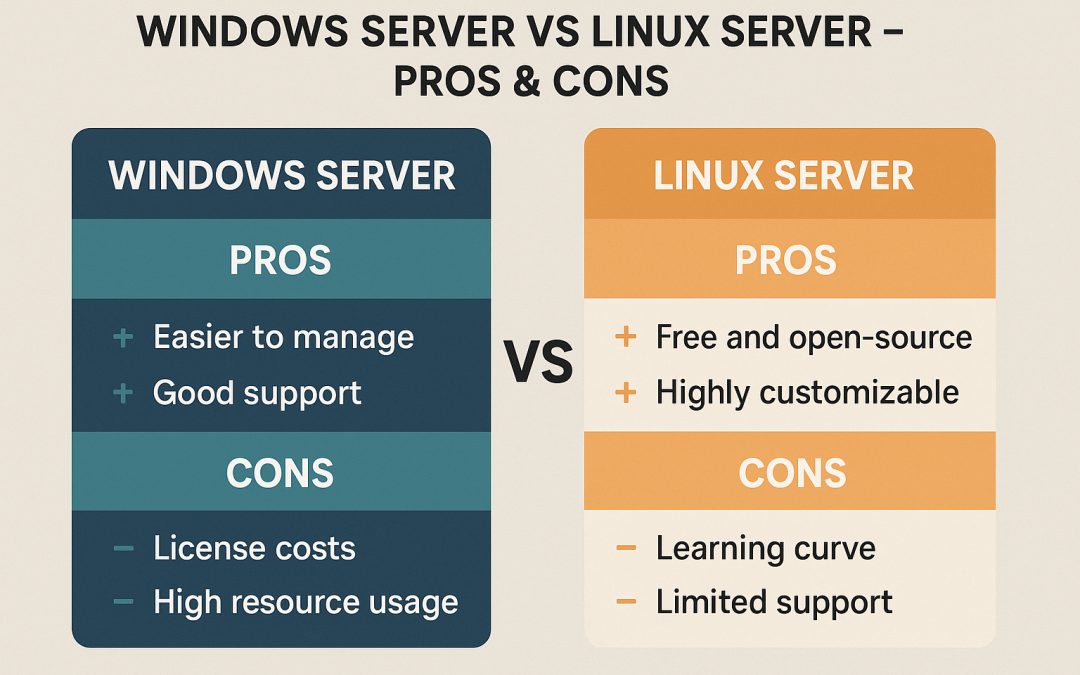Windows Server vs Linux Server – Pros & Cons
When it comes to choosing an operating system for your server, two names dominate the landscape: Windows Server and Linux Server. Each has its strengths and drawbacks depending on your needs, infrastructure, and budget. In this blog, we’ll explore the key differences, advantages, and disadvantages of each, helping you decide which platform is right for your environment.
Windows Server – Pros
- User-Friendly GUI
Windows Server offers a clean, intuitive GUI, ideal for administrators familiar with Windows OS. It’s easy to manage with graphical tools and wizards. - Active Directory Integration
Built-in Active Directory, Group Policies, and other enterprise tools make Windows Server ideal for centralized user and resource management. - Enterprise Support
Comes with professional Microsoft support, regular updates, and compatibility with major enterprise software like Exchange, SharePoint, and SQL Server. - PowerShell & Automation
Advanced scripting and automation through PowerShell allow efficient system administration and task scheduling.
Windows Server – Cons
- Licensing Costs: Expensive licensing, especially when scaling to multiple servers.
- Resource Heavy: Requires more CPU and memory compared to Linux alternatives.
- Closed Source: Limited flexibility in customizing the OS.
Linux Server – Pros
- Free & Open Source
Most Linux distributions (like Ubuntu Server, CentOS, Debian) are completely free and open source, reducing total cost of ownership. - Highly Customizable
You can modify and optimize everything to suit specific use cases, making it ideal for developers and sysadmins. - Lightweight & Fast
Minimal system resource usage allows for excellent performance on low-end hardware. - Security & Stability
Linux is renowned for its strong security model and rock-solid stability, often running for years without rebooting.
Linux Server – Cons
- Steeper Learning Curve: Beginners may find the CLI-based management daunting.
- Software Compatibility: Some enterprise software (like Microsoft products) don’t natively run on Linux.
- Fragmentation: Numerous distributions and package managers can complicate support and consistency.
Which One Should You Choose?
- Choose Windows Server if you rely heavily on Microsoft technologies, need AD integration, or have a team familiar with Windows.
- Choose Linux Server if you need a cost-effective, secure, and high-performance solution with full customization and control.
Windows Server vs Linux Server – Pros & Cons(F.A.Q)
Is Linux more secure than Windows Server?
Linux has a strong security track record and is less targeted by malware, but both can be secure if properly configured.
Can I run Windows applications on Linux Server?
Not natively. Tools like Wine or virtualization may help, but compatibility isn’t guaranteed.
Which is better for web hosting?
Linux is generally preferred for web hosting due to performance, cost, and support for PHP, Apache, and Nginx.
Does Windows Server support Docker?
Yes, Windows Server supports Docker and containers, though Linux still has a broader ecosystem for containerization.
